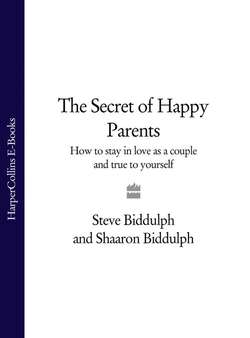Читать книгу The Secret of Happy Parents: How to Stay in Love as a Couple and True to Yourself - Steve Biddulph - Страница 8
1 About Us, About You About Us
ОглавлениеA book is really just someone talking: a very one-sided conversation. Since we are about to ‘bend your ear’ for a couple of hundred pages, you might well be wondering who we – the authors – are, and what we are like. So let’s get the embarrassing part out of the way!
We are very ordinary. Our house is never tidy, we laugh a lot, have been known to shout at the kids, we have fights with each other and lose the keys to the car. Aged in our late forties, we are getting old and funny-looking, and to the horror of our offspring, we don’t really care! We have lived together for twenty-five years and been married for the last sixteen of those. Our kids are fifteen and eight – a boy and a girl.
Steve grew up in a caring, but very emotionally constrained and rather isolated migrant family. (You guessed it – he’s English!) Shaaron is of Irish-German descent. She was born on the canefields of north Queensland, one of five little girls who, with their parents, had to struggle and work very hard to get by.
We were blue-collar kids who were lucky to grow up in the sixties when you could get an education, and advance in the world beyond the horizons of your parents. After a fairly bumpy adolescence, Steve trained as a counselling psychologist. Shaaron trained as a nurse and then a social worker. Looking back, the training was of limited value but we made some good friends, and it gave us something to do while we were growing up.
Steve specialized in families and children. Shaaron worked with deaf people, and before that, as a very young nurse, had to tackle the deep water of illness, death and bereavement.
Being thrown in the deep end at a young age turned out to be a plus. Unsure of ourselves but eager to do great deeds, we found that our patients appreciated our honesty in admitting that we didn’t know much. Not having much else to offer, we learned by listening very closely to people and looking carefully at every movement and expression, really wanting to understand life through those we were supposed to be helping.
By getting this close to our clients, we began to know and like them, often more than they liked themselves. Sometimes this approach of listening was helpful to the people we worked with. At other times, looking back, we were quite useless. But we never met anyone with whom we didn’t eventually feel some sense of a bond. This included ‘ordinary’ people, who were easy to like, but also people who were violent or criminal, even people who had killed others.
Counselling work is very absorbing. But after a few years we began to wonder if something was going wrong with family life in the late twentieth century. We were meeting hundreds of parents every year who had almost identical problems with their children. And hundreds of reasonable, caring couples who were struggling to keep their marriages alive. And this was just in one medium-sized country town (Launceston, Australia, pop. 62 000). Sometimes after a hard day’s work, you felt like calling a public meeting and saying: ‘What’s going on, guys?’ Or to put the question another way: ‘Why is family life so hard?’
